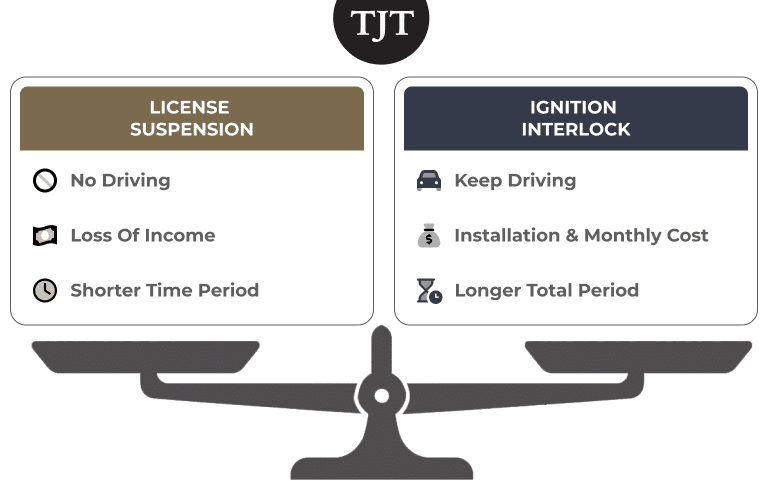Navigate New Jersey’s 2025 DWI Law Changes: Your Defense Options Explained
New Jersey DWI Laws Update for April 2025

The Tormey Law Firm has successfully dealt with numerous DWI cases in the state for several years. Our lawyers know how field testing, Alcotest results, licenses, and sentencing relate to your case in local courts. Our strategy is to evaluate risk and use that information to mount the best defense for your unique situation. The new law presents opportunities for negotiation and alternative scenarios after a conviction. The right consultation will allow a driver to fully realize the possibilities presented by the new law.
What Is an Ignition Interlock Device and How Does It Replace License Suspension?
The ignition interlock device is installed on the vehicle. The driver has to blow into the ignition interlock system prior to starting the vehicle. If the system detects alcohol, it will prevent the vehicle from starting. The ignition interlock system can also be imposed by the courts instead of suspending the driver’s license for a longer period, according to the new law.
Not all drivers will be able to use alternative driving options using this device. The judge evaluates the driving record and circumstances of the arrest prior to issuing the device. The driver must have a registered vehicle and valid automobile insurance. The driver must not attempt to circumvent or alter the device. This could cause the removal of the alternative suspension and reinstatement of the full suspension.
This system also has its costs. The driver must bear the costs associated with installation, regular monitoring, and services. The costs are different for different approved suppliers. The driver also has to appear for regular maintenance of the device.
Calculating Ignition Interlock Device Time vs. the Traditional Suspension Periods
The interlock alternative replaces the suspension with a longer term of device use. Time with the device counts at double the rate. A first offense with a three-month suspension becomes six months of interlock use. The driver completes six months with the device and receives credit for the three-month suspension.
The second offense leads to a suspension of two years. With the new option, the driver will use the device for four years. Learn more about second offense penalties. The months served with the device translate to two months served for the suspension. The time imposed may seem lengthy, but it allows the driver to continue his activities.
The third offense results in a suspension of ten years. However, when it comes to the new option, the motorist can drive the vehicle for twenty years using the device. This is not easy. Some offenders will opt for the suspension option if they are not driving anymore. Other offenders will opt for the device option for transporting a vehicle for their workplace and home requirements.
| Offense | Old Suspension | New Interlock Term |
|---|---|---|
| 1st Offense | 3 months | 6 months |
| 2nd Offense | 2 years | 4 years |
| 3rd Offense | 10 years | 20 years |
Note: Device time counts double toward suspension period.
Is the Ignition Interlock Device the Right Choice for Your Situation?
The ignition interlock option will prove beneficial for people who need to remain mobile. Individuals who use their vehicles for either professional or personal reasons tend to benefit the most from this option. Individuals who reside in areas that lack adequate transportation services also benefit from it.
Another consideration is cost. The device will cost a premium each month, although for many individuals, the dollar amount may still be lower when comparing costs versus the potential loss of income because of lost wages from a suspended license.
Insurance often changes during the interlock period. Many drivers must file an SR-22 certificate showing proof of financial responsibility. This form confirms that insurance coverage meets state minimums. Some insurers raise rates for drivers with interlock orders, while others offer limited coverage options.
A license suspension may prove better for others. Licensed motorists with brief periods of suspension, without cars, or lacking financial resources to install and maintain the system, will not see any need for the interlock device.
Meeting Ignition Interlock Device Requirements: From Installation to Compliance
New Jersey approves specific vendors to install and monitor interlock devices. The driver must select from this list and schedule installation within the time set by the court. Once installed, the vendor notifies both the court and the Motor Vehicle Commission. Only approved vendors can calibrate or remove the device.
Calibration occurs monthly. The driver brings the car to a service center, where technicians check accuracy and download records. Skipping or delaying these appointments can count as non-compliance and reset the service period. The device also requires periodic data uploads to confirm consistent readings.
The interlock will first analyze the driver’s breath alcohol content prior to driving. The system will also conduct rolling retests randomly while driving. The driver will need to pull over safely to collect a breath sample. The system will generate a violation entry if alcohol is present in the system’s analysis or if the driver does not undergo a retest.
Breaches include failing to pass a breath test, tampering, or attempting to circumvent the system. The provider will then notify the court or motor vehicle authority. This will lead to the interlock period extension, contempt, or revocation of the license. The violation is severe to the courts since it reflects the indifference displayed towards the conditions set by the court.
Plea Bargaining Now Allowed for New Jersey DWI Cases
For a long time, New Jersey prohibited plea bargaining for DWI offenses. The prosecution could not reduce or amend DWI charges. The new law allows prosecutors to assess several issues when deciding whether to negotiate a plea for consideration. These include the reliability of the field results, whether the Alcotest results are accurate, how the stop was made, past DWI offenses, and the blood alcohol level. Bargained resolutions may result in a plea bargain, a reduced sentence, or a sentencing plan that allows for the driver’s reinstatement in mainstream life. This depends on the circumstances, evidentiary sufficiency, and the judgment of the prosecuting attorney.
Factors That Determine DWI Plea Bargaining Eligibility
Not all DUI cases are amenable to negotiation, and not all will benefit from negotiation. Then again, a borderline result for alcohol, for example, can raise an issue that can lead to negotiation. So can discretionary issues, such as discrepancies in the client’s observations, or problems arising when tests are administered or when results are handled. Then again, a discretionary arrest may also raise questions that can lead to negotiation.
Repeat offenders will face a tougher evaluation, particularly if the offenses were recent. The blood alcohol level is also important. The difference between a number that is only slightly higher than .08 and a number that is significantly higher will present different circumstances. Prosecutors will scrutinize any effort that challenges the reliability of the device or the officers’ conformance with procedures.
Factors such as a clean driving record, stable employment, and treatment attendance, for example, could support a positive negotiation outcome. The courts also examine hardship, for example, having to provide health care. These circumstances will not guarantee a plea, but each can contribute to the whole picture that is the driver.
Defense Strategy Considerations Under New Jersey’s 2025 DWI Law
The timing of discussions can prove whether the district attorney is amenable to negotiation. Some district attorneys will not entertain pleas until the review of all discovery has been completed. Other district attorneys will not entertain pleas until the case is nearing trial. Defense attorneys need to identify such patterns in each district attorney’s office to prevent lost opportunities.
The leverage in the defense comes from the evaluation of testing procedures, observations, and the motor vehicle stop. If any holes are found, then it can form the basis for a motion for reduced charges or penalty. The ignition interlock option affects the negotiation process. The prosecution may allow a plea, given that the alleged driver will install the interlock system instead of serving the suspension. The defense attorney can negotiate structured deals that include the interlock system along with fines or reduced penalties.

First-Time DWI Offenders: IID Options and Plea Bargaining Advantages
First offenders will fare the best under the proposed amendments for April 2025. The ignition interlock alternative will benefit such motorists by enabling them to avoid a full suspension in several circumstances. The net result of a shorter period for the base suspension will amount to a shorter period using the device.
The fine, interlock use, and insurance requirements are still present for a first offense, but the chance to continue to drive mitigates the sentence. The new option for a plea bargain negotiation is also advantageous for first offenders. An attorney can persuade prosecutors to plead down for several reasons, first for the absence of any prior offenses, secondly for when the BAC level is close to the legal limits, and thirdly when questionable issues are present in the case.
Some first offenders can also choose to finalize the case without a conviction for DWI by amendment for a lower offense. This could allow them to keep a clean driving record and avoid any future risk that comes with it. The options for first offenders depend on the circumstances of the case and what each prefers to accomplish. Quick resolution, for example, can occur through a plea bargain. Improved mobility can also be achieved through the interlock alternative.
Understanding Repeat DWI Penalties Under New Jersey’s 2025 Law
The ignition interlock device option becomes increasingly demanding for drivers with prior convictions. A second offense can lead to several years of required device use. A third offense can reach terms that few drivers find realistic. The option helps maintain limited driving privileges, but it requires consistent payments, scheduled maintenance, and perfect compliance for many years. For many repeat offenders, this option may be more burdensome than the suspension it replaces.
Prosecutors give repeat offenders closer scrutiny and fewer negotiation options. The history of prior convictions weighs heavily in every discussion. Courts impose mandatory jail terms that remain in place regardless of the ignition interlock election. The device affects license status, not incarceration time. Counsel must plan both aspects together so that the driver’s sentence and interlock period do not overlap in a way that prolongs restrictions unnecessarily.
A third offense brings a ten-year suspension or a twenty-year device period if the driver elects the ignition interlock path. For detailed information, see our guide on third offense DWI penalties. That length is rarely practical. Some drivers choose suspension and wait for restoration rather than face two decades of monitoring. Others decide the device is worth it to keep working and supporting their family. The choice depends on age, employment, and financial capacity.
Defending Breathalyzer Refusal Cases in 2025
Plea negotiation is now possible in refusal cases under the 2025 law. Prosecutors can consider them when the record shows uncertainty about the implied consent warnings or gaps in the officer’s explanation of rights. Combined DWI and refusal cases create complex strategies. Sometimes counsel seeks dismissal of the refusal charge in exchange for a plea to the DWI count. Other times, the focus is on the refusal itself if the state’s test evidence is weak or incomplete.
Some parts of the refusal sentencing cannot be changed. Minimum license suspensions, fines, and required interlock use still apply under the statute. Negotiation can affect charge selection or duration within statutory ranges, but cannot erase these requirements.
Strategic decisions depend on the video, the clarity of the warnings, and how the officer handled repeated instructions. A driver who was confused or interrupted during the implied consent reading may have grounds to contest the charge or to seek a reduced outcome. The new plea authority gives defense counsel more tools, but success depends on case-specific facts and disciplined use of those tools from the start.
Understanding the Costs of Ignition Interlock Devices
The ignition interlock path also has direct costs. The driver must pay for the costs of installation, calibration, and removal once the period has expired. The driver will also require periodic monitoring, which will amount to additional fees. The costs will continue for the period the ignition lock is installed in the vehicle.
The alternative is for the driver to use a full license suspension. The driver will lose income or his or her employment if he or she has to drive without a vehicle. Using either rideshare services or taxis on a daily basis will cost more than the cost of an interlock in a brief period of time, let alone for rideshare services and taxis that use gasoline, putting additional wear and tear on vehicles.
An individual can expect his or her insurance rates to increase after a conviction for a DWI offense. However, a negotiated plea can sometimes prevent a DWI offense from occurring, which helps in the future by not increasing an individual’s rates. The fines, costs, and surcharges levied by the courts will still be present regardless of the outcome, although some parts will be reduced if it is a negotiated plea.
Building a Strong DWI Defense Under New Jersey’s 2025 Law

Whether to seek a suppression motion or negotiate a plea can also depend upon the clarity of the record. An arrest with little basis for the stop may lead to the filing of a motion promptly. If there are a few viable issues for defense, yet highly detrimental personal ramifications, negotiation may occur early. The timing is important. To seek a motion too early can end the discussion with the district attorney. Delay can lower the possibilities for a negotiated resolution. The lawyer has to monitor the progression of the case in the local trial setting.
Leverage comes from preparation and legal acumen. The defense will collect police files, videos, radio communication, breath test results, and maintenance data. If needed, an Alcotest expert will examine the files for testing. If concerned about a medical issue or related to alcohol metabolism, then a toxicologist can also give an expert opinion. Even if it doesn’t lead to a trial, readiness to offer a sound expert opinion can shift a prosecutor’s judgment on whether prosecution is advisable.
Contact the Tormey Law Firm for a Free NJ DWI Consultation Under the New Law
The new DWI law in New Jersey, effective April 2025, represents a significant change for offenders by allowing driving privileges through ignition interlocks rather than automatic license loss. The Tormey Law Firm, experienced in DWI defense, supports clients through each stage of the process, from initial evaluations to trial preparation.
We offer free consultations for those charged with DWI under the new law. Our attorneys are knowledgeable about local practices and how the new regulations impact case resolutions, license protections, and plea negotiations. We also assist with cases involving breathalyzer refusals, license suspension hearings before the Motor Vehicle Commission, and out-of-state drivers.
Additionally, we seek post-conviction relief when previous sentences can be modified under the new law. Contact us today at (201) 556-1570 to learn how the changes may affect your case.

